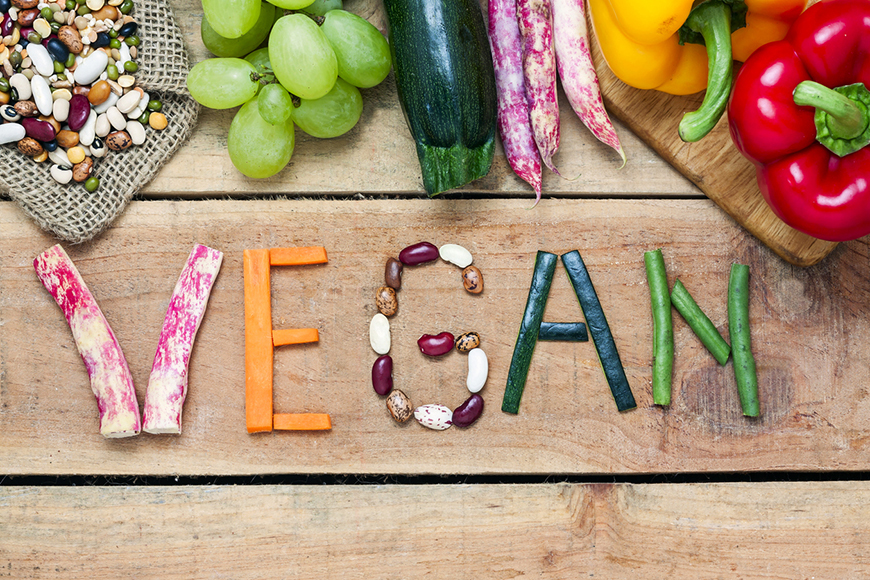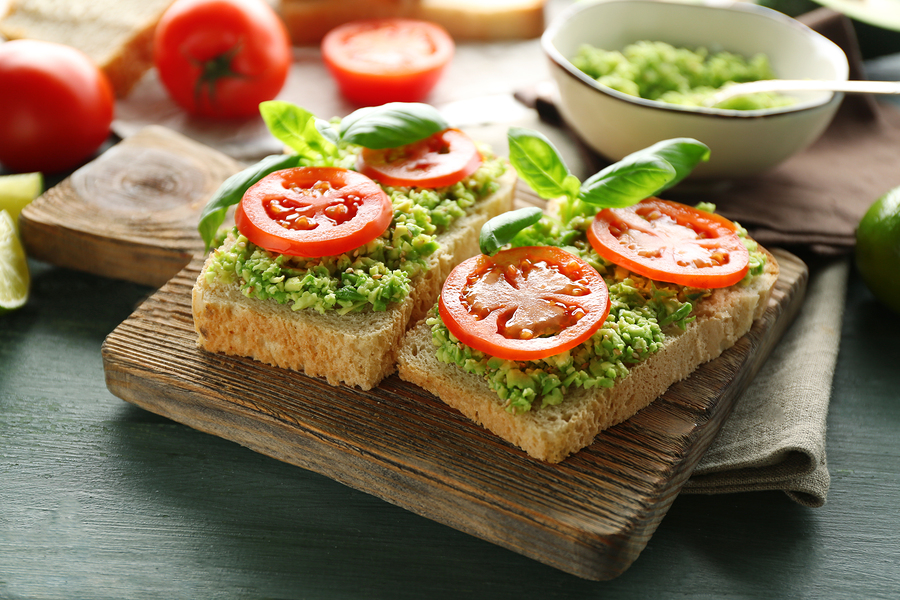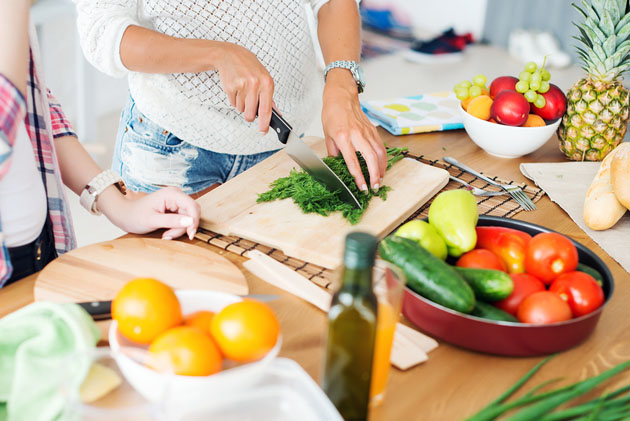10 Ways Being a Vegan Benefits Your Health
You're aware of what a vegan lifestyle is, but could you adopt it yourself?
17 January 2016
ewfood

Traditionally, vegans - people who do not use, consume, or sometimes even wear animal products - were misunderstood as fringe eaters or alternative lifestyle freaks with an unnatural passion for animal rights, but the demographic of vegans and vegetarians is changing. A Hartman Group study found that 12% of Millennials are “faithful vegetarians”, compared to 4% of Gen X’ers and 1% of Baby-Boomers. In recent generations the percentage of vegetarians and vegans has steadily increased, with more and more regular folks, and not just token celebrities, embracing the lifestyle.
While many vegans do feel passionately connected to the animal rights cause, for many other practitioners who are vegan, it has simply become a routine that goes far beyond animal rights, bringing them health, happiness, and vitality on a daily basis. Following a well-planned and balanced vegan diet ensures not only health benefits in the short term, but has been linked to long-term prevention of some major diseases!

One of the strongest arguments for switching to a vegan diet full of foods such as fresh fruits and vegetables, whole grains, nuts, and beans are the obvious nutritional benefits. Plant-based foods are generally higher in vitamins, minerals, phytochemicals and antioxidants. In addition to good nutrition and disease prevention, eating vegan also provides many physical benefits including weight loss, increased energy, stronger hair and nails, and a reduction in allergies and migraines. There are other surprising benefits as well!
Here are 10 important ways that being a vegan benefits your health:
1) Extra fiber
Did you know that a vegan diet is also naturally high in fiber? Fiber in the diet not only leads to healthier and more regular bowel movements but it helps protect against colon cancer, helps heal leaky gut, aids in protecting against diarrheal diseases, and promote beneficial gut bacteria.
2) Plant-based protein
That protein is important for healthy body functioning and repair is no surprise. However, it may be a surprise to learn that veggies, beans, nuts, peas, lentils, and soy products are all great ways to get the right amount of protein in a vegan diet. In fact calorie per calorie broccoli is an incredibly protein-rich vegetable. In addition to being loaded with vitamin C, vitamin K, fiber, potassium, and other cancer-fighting properties, 1 cup of chopped broccoli (96 grams) contains 3 grams of protein, with only 31 calories. Peanuts, brussel sprouts, and legumes all also boast protein levels of 20% or more of their calories from protein.
You might also be interested in:
- The ultimate glossary of cooking terminology
- How much sugar are you really eating?
- How to take food pictures like a professional
3) Cancer prevention and cure
A balanced vegan diet has been shown to reduce risk of developing, or preventing, a number of diseases including cardiovascular disease, high cholesterol, high blood pressure, type 2 diabetes, arthritis and many types of cancers. One major study showed that men in the early stages of prostate cancer were able to either stop the progress of their cancer or even reversed their illness by switching to a vegan diet. In addition to the beneficial effects of increased fiber reducing the risk of developing colon cancer, eating a diet consisting of whole grains, along with fresh fruits and vegetables, can also greatly reduce your risk of developing breast cancer. Women in countries consuming very little meat and animal products have a much lower rate of breast cancer than do the women in countries that consume more animal products. Primary care physicians, acute care workers, and other health care professionals are routinely surprised by the dramatic results to overall health that being a vegan facilitates.
4) Osteoporosis
Another major concern for women especially, is our propensity for osteoporosis. The childbearing and breastfeeding years can take quite a toll on our bodies and especially our bones as our body depletes our supplies to grow and feed our babies. Bone health and replenishment depends on a balance of a range of nutrients including protein, calcium, potassium, magnesium, sodium, and many others. With a healthy vegan diet, these nutrients combine in the best way to prevent osteoporosis.
5) Healthy more attractive skin
The vitamins and minerals in vegetables play a big role in healthy skin, but did you also know that fruits and vegetables can give you an attractive glow – even more attractive than a suntan? In addition to aiding a reduction in fine lines, wrinkles, and blemishes, consuming a vegan diet naturally boosts your skin color due to what scientists are calling the 'carotenoid glow'.
The red and yellow pigments found in bright fruit and vegetables increase skin yellowness while tanning makes skin turn brown. Researchers at Leeds and St Andrew’s universities documented that the change in skin pigmentation brought about by eating vegetables with the highest level of carotenoids including sweet potatoes, carrots, tomato juice, pumpkin, spinach and broccoli makes skin look far healthier. Three-quarters of volunteers found ‘carotenoid coloration’ from fruit and veggies more attractive than ‘melanin coloration’ from sun-tanning.
6) Body odor changes
Believe it or not one study found that eliminating dairy and red meat from the diet can significantly improve the attractiveness of your body odor - going vegan just means smelling better.

7) Sugar reduction
Most people have heard that some cultures consume way too much sugar. An average American consumes more than 126 grams of sugar per day - more than twice what the World Health Organization recommends for daily intake, which is roughly 50 grams of sugar for someone of normal weight. In Germany, the second-most sugar-consuming nation in the world, people eat roughly 103 grams on average, in the Netherlands 102.5, in Ireland, 97. Switching to natural sweeteners that are not synthetic, processed, or derived from animal products is an easy way to reduce our consumption of refined sugars and a healthier way to eat. Many vegans eschew most refined and decolorized inorganic processed sugar because most processed cane sugar is refined through cow-bone charcoal.
SEE ALSO: Why you should stop storing your food with plastic
8) Positive impact on global food supply
Feeding massive amounts of grain to animals who are being raised as food sources reduces the amount of grains and other nutrient-dense food that is available to citizens. People are going hungry while the same food they could be eating themselves is being served to animals raised for slaughter. Eating vegan ensures that we’ve removed ourselves from participating in this cycle of imbalance.
9) Reduced hormone consumption
When you’re eating animals that have been injected with growth-speeding hormones, like those approved by the USDA (estradiol, progesterone, testosterone, and the synthetic hormones trenbolone acetate, progestin melengestrol acetate, and zeranol) those hormones circulate through your body as well. Not only can the consumed compounds disrupt your natural hormonal balance but some of the hormones administered to animals actually promote tumor growth in humans. Going vegan can eliminate all food-sources of extra hormones, allowing our bodies to reregulate and develop naturally.
10) Avoidance of antibiotics
Antibiotics are frequently given to feed animals to encourage weight gain and treat animals like dairy cows who have also been administered recombinant bovine growth hormone (rBGH) to stimulate milk production. This increase in antibiotic usage, which we also consume when we eat the flesh of these animals, leads to increased bacterial resistance in the general population because many of the antibiotics used to treat human infections are also used in feed animals.
A vegan diet can be a much healthier way to eat and can help you eliminate or reduce other allergies and intolerances as well including cow’s milk, gluten, and other common allergens. Becoming vegan also means you’re likely to eat out less which can be easier on your finances but does require extra effort and prep. Use ExpatWoman Food to find all the vegan recipes you need to get started!
 About the Author
About the Author
Zyana Morris is a passionate health and lifestyle blogger who loves to write on prevailing trends. She is a featured author at various authoritative blogs in the health and lifestyle industry and is a staff writer at Centracare.org, a Tampa urgent care center. You can contact her through Facebook and Twitter.
- Tags:
- healthy eating
- vegan
- weight loss
- dairy














